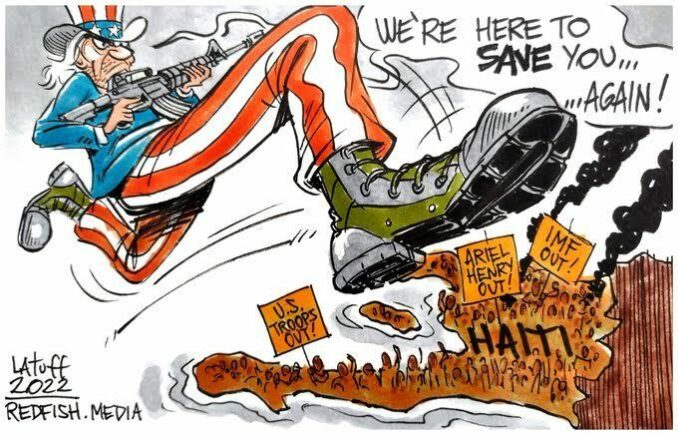

Port-au-Prince 2023
For over 200 years, the rulers of the United States — the largest, wealthiest state in the Western Hemisphere — have been intensely concerned with controlling the internal affairs of Haiti, the most exploited state in this hemisphere, to the advantage of U.S. ruling class interests.


The main obstacle to U.S. control has been the determined resistance of the revolutionary Haitian masses.
Ever since the assassination of Haiti’s elected president Jovenel Moïse in July of 2021, the Haitian masses have been in the streets and have centered their protests against interim Prime Minister Ariel Henry. Washington had selected and endorsed Henry, as did its junior partners Canada and France — all leaders of the Core Group — but the Haitian people certainly did not elect him.
Early in 2024, the opposition to Henry began to coalesce into groups — some of which were armed. These groups joined a broad, fairly loose coalition demanding that Henry step down and get out, and that the Core Group stop meddling.
Port-au-Prince 2023
As March began, interim Prime Minister Henry was outside the country arranging for a contingent of Kenyan cops to do the initial repression of the Haitian people, called “peacekeeping” in U.S. and U.N. news releases. This loose coalition then attempted to seize the Port-au-Prince airport, shooting up the main terminal.
Unable to land in Haiti, Henry’s plane wound up in Puerto Rico. There, the FBI is, according to some reports, questioning him about his role in Moïse’s assassination. Henry announced his resignation on March 11, to go into effect when a presidential council is established. U.S. Secretary of State Antony Blinken set up the Presidential Council.
Washington seeks to dominate Haiti
This Presidential Council will be allowed to choose Haiti’s next prime minister, who will not be a member of parliament because the terms of all the parliamentarians have expired and there have been no parliamentary elections since 2016. The new prime minister, under U.S. supervision of course, will select ministers to create a government.
Traditional Haitian politicians, representing different factions of the Haitian bourgeoisie, have been drawn to this Presidential Council, a device that the U.S. has imposed before. Washington did this after the 1986 overthrow of Jean-Claude Duvalier and following the 2004 U.S.-organized coup against Jean-Bertrand Aristide, a democratically elected Haitian president.
Already, two members have left the Council, which has become like “crabs in a basket,” snapping at and climbing on each other, finding it easier to tear each other apart than to agree on any issue that concerns the nation, according to Berthony Dupont in Haïti-Liberté (March 27).
While there was a certain amount of unity of the disparate groups opposing the administration of Henry in getting him out, there are still very severe security issues that deleteriously impact education, transportation, food imports and jobs, especially in Port-au-Prince. Hundreds of thousands of Haitian families are internally displaced because of criminal activity. Food insecurity, verging on famine, affects about half of the people living in Haiti.
The U.S. response to these problems has two wings. One involves setting up an unannounced naval blockade. Its existence was hinted at March 24 when Haitian sailor Jean-Robert Cinéus tried to get to La Gonâve, a fairly large island close to Port-au-Prince, but was turned back by U.S. Marines in a Zodiac boat from a U.S. Navy vessel stationed in Port-au-Prince Bay.
Google-search turns up thousands of articles and TV reports on how Florida Gov. Ron DeSantis, Customs and Border Protection, the Border Patrol, the Coast Guard and the U.S. government in general are preparing to deal with large numbers of fleeing Haitians.
The second involves an opinion piece in The Washington Post published March 25 by former U.S. ambassador to Haiti James B. Foley entitled “The United States will have to intervene in Haiti.” Foley was the ambassador in 2004 when the coup against Aristide was organized. Foley often provides the authoritative, near-official U.S. comments for TV and other media reports on conditions in Haiti.
Whatever the scenario, anti-imperialist forces need to be ready to oppose U.S. intervention in Haiti.
Hamas issued the following statement on April 24, 2025, published on Resistance News Network. The…
By D. Musa Springer This statement is from Hood Communist editor and organizer D. Musa…
Portland, Oregon On April 12 — following protests in Seattle and elsewhere in support of…
This statement was recently issued by over 30 groups. On Friday, March 28, Dr. Helyeh…
When Donald Trump announced massive tariffs on foreign imports April 2, Wall Street investors saw…
The century-long struggle to abolish the death penalty in the U.S. has been making significant…